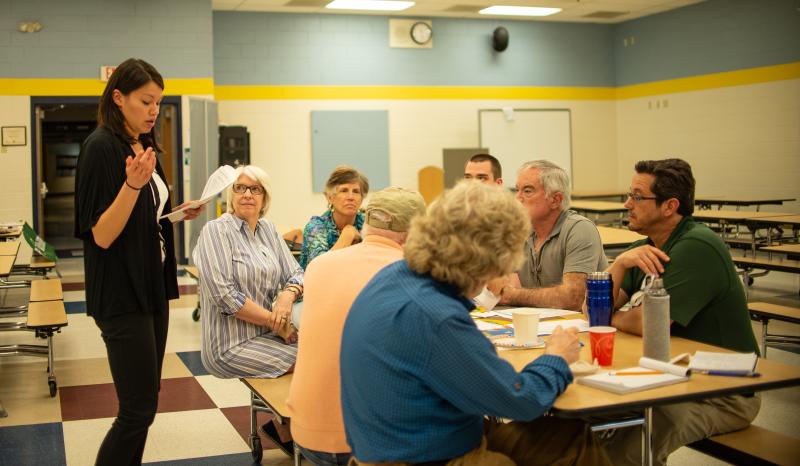‘Game of Floods’ workshop held in Milton
Southeast Rural Community Assistance Project partnered with the Milton Sustainability Committee and the Urban Sustainability Directors Network to host a workshop in Milton April 14, focused on sustainability, resilience and community interaction.
SERCAP Delaware and Maryland State Manager Jean Holloway welcomed the participants who included Milton Mayor Ted Kanakos and Milton Chamber of Commerce Director Terri Fox. Holloway works with SERCAP to provide communities with information and resources pertaining to natural resources, recycling, sustainability, and other environmental aspects.
“We aim to inform and gather important information about the different aspects of Milton as a community and its stance on sustainability. Our hope is to learn from you, the community, and the concerns you may have. Milton has given us a grant to hold this workshop, and truly involve each member of this town while immersing you into an informative game which represents issues that stakeholders, policymakers, and local government face when developing a sustainability plan,” said Holloway.
Kristin Baja, climate resilience officer for USDN, thanked the audience for attending and trying something new. USDN is a peer-to-peer organization focusing on sustainability, climate resilience, economic prosperity and social equity. Baja gave background information on what sparked the idea for this game, such as rising global surface temperatures, extreme heat and drought, sea level rise and other environmental issues that a town, especially near the coast, may be experiencing. “Weather is your mood; it varies from day to day. Climate is your personality - we see how it changes over time,” Baja said when relating weather and climate to human perspective. “We need to take into consideration the climate hazards and impacts, while increasing our resilience or ability to anticipate, mitigate, and accommodate these changes,” she added.
Baja introduced the training that would be taking place, called the “Game of Floods,” an interactive game-based exercise designed to help participants understand the process of conducting vulnerability and risk assessments while using strategies to protect public assets and infrastructure from current or future flooding. During the training, team members engage in a progression of steps including: understanding climate science, conducting an asset inventory, identifying vulnerability, and developing an adaptation plan along with budgeting.
The room was split into two groups, and each team member was assigned a role such as deputy mayor, HOA representative, sustainability planner, and various infrastructure and public representatives; in which the person would assume the mindset and duties of whom they were assigned. The map of the fictional town, Resilience Harbor, a low-lying coastal town which was originally an agricultural area but has grown into a resort-based community was presented to each team. Resilience Harbor is prone to coastal and river flooding, has a population of 225,000, relies on fishing and tourism for economic growth, and contains 24 assets (such as infrastructure, public services, housing communities, historical sites, recreation, and natural occurring locations such as a beach and mangrove forest). Each member of the team, assuming their role, were asked to reach a common ground on the nine most vulnerable and important assets based on a scenario (such as sea level rise over the next 50 years). Teams performed a vulnerability assessment, rating exposure and the sensitivity of these chosen assets from low to high. Groups then developed an adaptation plan and were given a “budget” to make improvements and changes with each different option carrying a varying cost. The final decisions were presented by the “deputy mayor” of each group to see how the other had handled a similar situation.
Following the end of the game, members were asked about the different steps of the process and what they had learned from participating. Answers included: “It is hard to assume a specific role if we have a different opinion than this person would”; “Not all voices are always heard”; “We were able to be passionate and inclusive, and our opinions were shown in our decisions”; and “Natural leaders seem to emerge in groups, as they would in a real-world environment.”
“Long term thinking is essential for the health of a community because one thing always effects another, creating a chain of events from one alteration. Sometimes it is hard to prioritize and do things that you wish to do given constraints of a budget and differing of minds and opinions. For every action there is a reaction. This game is based on real world issues and circumstances, and we wanted to share the complexity and group building activity with you because as a community member you are responsible for getting involved. These types of activities really support a community’s movement for action and allows for conversation and transparency across the board,” Holloway said.
Information on SERCAP, the Milton Sustainability Commission and USDN can be found on their corresponding websites. The game is available for download so you an experience it with family and friends by visiting: https://www.usdn.org/.




















































